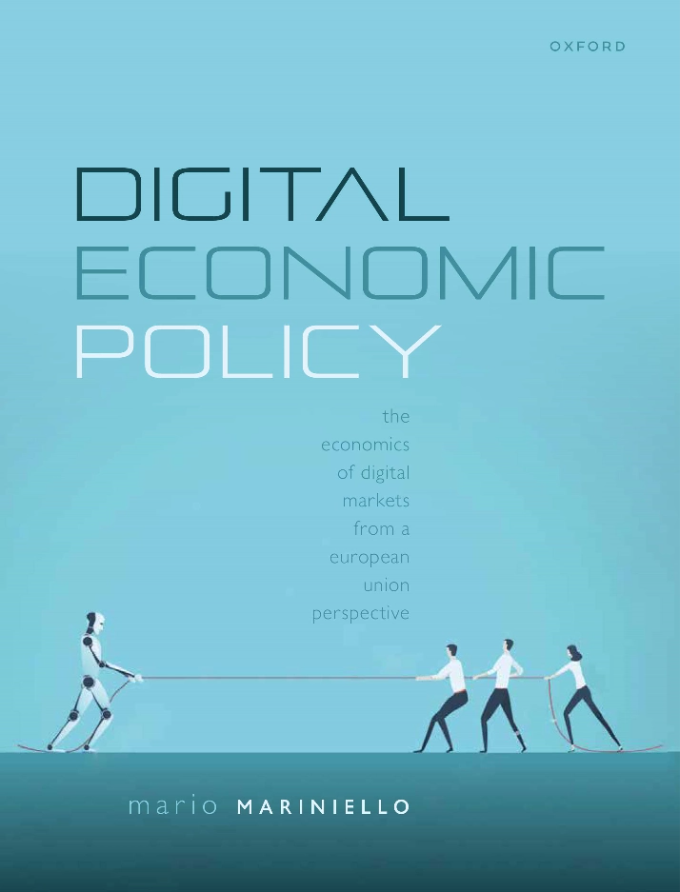Teaching and research
Teaching
The digital economy
I. Description
The course covers aspects of European digital integration from an economist's perspective; it provides students with an analytical framework to understand and discuss the European Commission’s Digital Single Market strategy.
II. Course Learning Outcomes
At the end of the course, students are expected to grasp fundamental analytical tools to understand, analyse and assess the impact of EU digital policies on the European economy and society. The fil-rouge of the course is the European Commission's Digital Single Market's strategy and related initiatives. The approach is both theoretical and pragmatic: the goal of the course is to prepare students to give an informed and economically sound advice to a hypothetical EU Commissioner for digital affairs.
III. Course Contents and Readings
The course is structured around five main themes. Reported below are topics that the course could cover for each of the four themes (with the caveat that adjustments in the program may occur, depending on the interest of students, timing constraints and the evolution of EU policies)
Theme 1: Towards a Digital Single Market: History of digitalisation, global trends, and overview of digital policies across the world; the Digital Single Market strategy; Facts about the European digital economy; Digital disruption and innovation
Theme 2: Digital Infrastructure: Telecoms: network investment and regulatory approaches; The Data Economy; Cyber-security
Theme 3: Digital Markets: Competition policy in digital markets; On-line platforms and audio-visual; Copyright, standards and intellectual property rights; E-Commerce, digital trade and taxation regimes; the collaborative economy.
Theme 4: Digital Society: Digital skills and the future of work; Emerging technologies ( the internet of things, connected and self-driven vehicles, block-chain, e-health etc.); Democracy, facts and information in a digitised society
Theme 5: Artificial Intelligence: Artificial Intelligence is a broad theme which encompasses everything touched upon during the course. Hence this also constitutes a general recap.
Students' active participation/discussion during classes and working group sessions is expected.
Past courses:
• The Digital Economy – College of Europe – 2022/2023
• The Digital Economy – University of Namur – 2022/2023
• The Digital Economy – College of Europe – 2021/2022
• The Digital Economy – University of Namur – 2021/2022
• The Digital Economy – College of Europe – 2020/2021
• The Digital Economy – University of Namur – 2020/2021
• The Digital Economy – College of Europe – 2019/2020
• The Digital Economy – College of Europe – 2018/2019
• The Digital Economy – College of Europe – 2017/2018
• The Digital Economy – College of Europe – 2016/2017
• European Market Integration - Université Libre de Bruxelles – 2015/2016
• European Market Integration - Université Libre de Bruxelles – 2014/2015
Resources for students
My students past works
Readings
Research
List of publications in reverse chronological order
* "Reinforcing EU merger control against the risks of acquisitions by big
tech." Policy Brief 11/2025, Bruegel
* "Biometric technologies at work: a proposed use-based taxonomy" (with Mia Hoffmann) Bruegel Policy Contribution Issue n ̊23/21| November 2021.
* “Blending the physical and virtual-a hybrid model for the future of work" (with Grzegorczyk, M., Nurski, L., & Schraepen, T.). Bruegel Policy Contribution, 2021
* "Competition agency design in globalised markets". (with William E. Kovacic) World Economic Forum 2016
* "The long road towards the European single market". (with Sapir, A. and Terzi, A.), Bruegel working paper, 2015
* "Antitrust, regulatory capture and economic integration" (with Neven, D. and Padilla, J.). Bruegel Policy Contribution, 2015
* "Addressing fragmentation in EU mobile telecom markets" (with Francesco Salemi). No. 7931. Bruegel, 2015
* “The Role of Publicity Requirement on Entry and Auctions Outcomes” (with Decio Coviello), Journal of Public Economics, 109, 76-100 – 2014
* "Foreign takeovers need clarity from Europe" Bruegel Policy Brief 2014/07, December 2014
* “Memos to the Commissioners for Competition, Digital Agenda and Single Market” in Sapir et al. EU to DO 2015-2019:
* "Commitments or Prohibition? The EU Antitrust Dilemma” Bruegel Policy Brief 2014/01, January
* "The Dragon awakes: Is Chinese competition policy a cause for concern?” Bruegel Policy Contribution, 14 - 2013
* "Do European Union fines deter price-fixing?” Bruegel Policy Brief 2013/04, May 2013
* "Standard-setting abuse: the case for antitrust control”. Bruegel Policy Brief 2013/01, February 2013
* "European antitrust control and standard-setting.” Bruegel Working Paper 2013/01
* "Should Variable Cost Aid to Attract Foreign Direct Investment be Banned? A European Perspective." Journal of Industry, Competition and Trade (2013): 1-36
* "Fair, Reasonable and Non-Discriminatory (FRAND) terms: a challenge for Competition Authorities." Journal of Competition Law and Economics 7.3 (2011): 523-541
* “Competition and the Role of Public Authorities”. Diss. European University Institute, 2008

DIGITAL ECONOMIC POLICY
The Economics of Digital Markets from a European Union PerspectiveDigital Economic Policy is a first-of-its-kind textbook covering all policy dimensions of the digital economy at the European level. It is a journey during which students may learn about telecom markets, the data economy, the digitization of the public sector, cybersecurity, the platform economy, liability for online content, e-commerce, the sharing economy, the impact of technology on labour markets, digital inequality, disinformation, and artificial intelligence.
The book's primary goal is to prepare students to give informed and economically sound advice to an EU policymaker for digital affairs.